Gwich'in People Resist Arctic Drilling
Air Date: Week of October 31, 2025
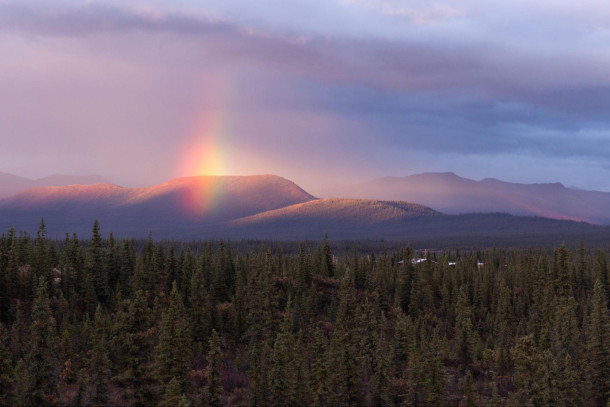
A rainbow follows a storm over Vashraii K'oo (Arctic Village) bordering the Arctic National Wildlife Refuge. (Photo: Emily Sullivan, Gwich'in Steering Committee)
The fossil fuel industry has sought drilling for oil in the Arctic National Wildlife Refuge for decades and a recent Trump administration order brings the renewed threat of oil extraction in ANWR. But Gwich’in Alaska Natives, which consider the land sacred and local Porcupine Caribou as relatives, are expressing alarm at how drilling in this fragile environment could upend their world. Kristen Moreland, Executive Director of the Gwich’in Steering Committee, joins Host Steve Curwood to discuss.
Transcript
DOERING: It’s Living on Earth, I’m Jenni Doering
CURWOOD: And I’m Steve Curwood.
Encouraged by US Supreme Court Justice William O. Douglas, back in 1960 President Dwight D. Eisenhower created what is now called the Arctic National Wildlife Refuge. It’s the largest national refuge in the US and provides sanctuary for the abundant wildlife there, especially the Porcupine Caribou herd. They migrate in such great numbers that ANWR, as it’s called, has been compared to the Serengeti in East Africa. But since the discovery of vast oil and gas deposits in the region in the late 1960’s, the fossil fuel industry has set up shop, and now operates a major oil field in Prudhoe Bay, on the coast just west of ANWR. And for forty years there has been pressure to drill in ANWR itself. The first Trump Administration auctioned oil leases, only to have them canceled by the Biden Administration. And now the second Trump Administration is again opening ANWR for oil leases, though the current price of oil would make drilling uneconomical. On the front lines against drilling in ANWR are the Native Alaskan Gwich’in, and joining us is Kristen Moreland, chair of the Gwich’in steering committee. Welcome to Living on Earth, Kristen!
MORELAND: Thank you for having me.
CURWOOD: So on the coastal plain there where the Trump administration has decided to open up for drilling. Sometimes I've heard you folks call it God's country, explain that for me, please.
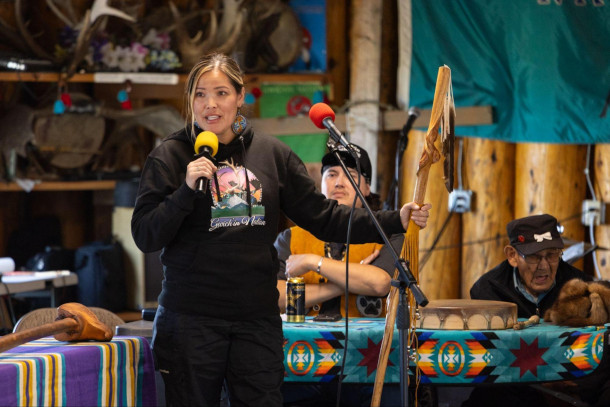
Kristen Moreland is the executive director of the Gwich’in Steering Committee based in Fairbanks Alaska. (Photo: Emily Sullivan, Gwich'in Steering Committee)
MORELAND: Our elders call our land Iizhik Gwats’an Gwandaii Goodlit, which means the sacred place where life begins. We call it God's country, because we don't see the things that you guys see anywhere else. We don't see road development, we don't see refineries, we don't smell the pollution. All we see is pristine land our Gwich'in communities, we live along the migration route in Canada and Alaska, and have relied on the caribou for thousands of years. We use every part of the caribou. It has helped us sustain families and entire communities through harsh winters. Our winters get down to like 70 below. Our relationship is spiritual. The caribou we see it as a relative, not just a resource. Elders always told me that we are half of them, and they are half of us, and they carry half of our heart, and we do theirs the land and traditional knowledge. We follow the migration routes of the herd. We always had knowledge of our land, the weather, so we see the animal behavior, and we know that there is climate change, we know that there's something wrong. We have been doing this for years and we'll continue it, hopefully, if drilling doesn't happen.
CURWOOD: So talk to me about your reaction to this recent decision by the federal government.
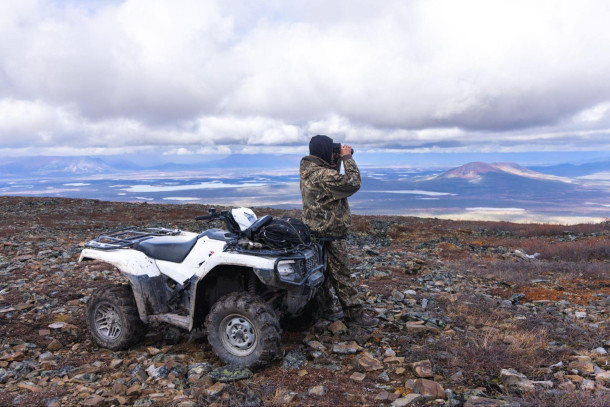
A Gwich'in hunter scouts for the Porcupine caribou herd in the fall hunting season. (Photo: Emily Sullivan, Gwich'in Steering Committee)
MORELAND: The action by the Trump administration is a direct attack on the Gwich'in. We have for decades been a voice for the caribou and stood against the destruction of the Arctic Refuge. And when we heard this, we were just appalled. We didn't expect this decision, and it's just devastating to our people that they can just not care about human rights at all. They don't care about our people. They said that they talked to all the northern communities in Alaska, and we're all okay with it, but not one Gwich'in community have they talked to, not one. And we're the ones that are going to face the consequences of their actions.
CURWOOD: To the West of where you are, what's going on with the caribou there, and how might that be related to oil and gas extraction?
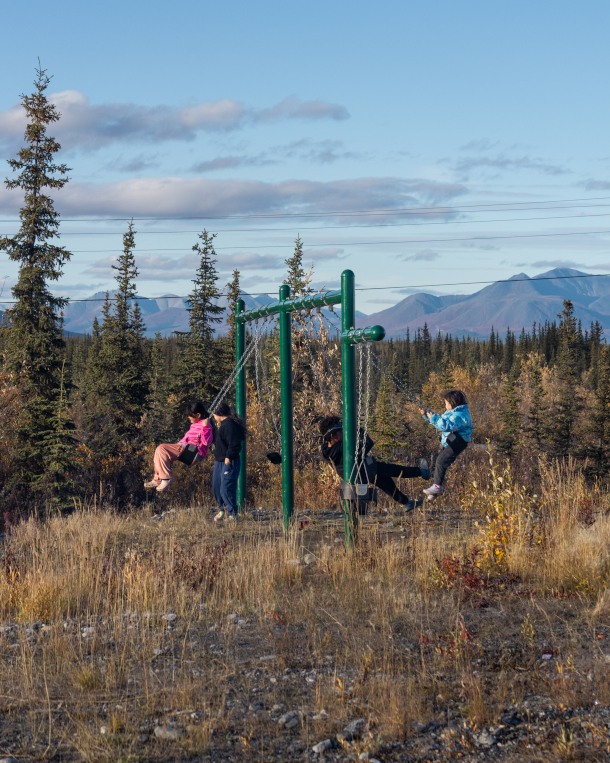
Gwich'in youth play outside the Vashraii K'oo (Arctic Village) Tribal Hall. (Photo: Emily Sullivan, Gwich'in Steering Committee)
MORELAND: So a study has showed mounting evidence that caribou in the North Slope oil field areas, even after generations, continue to stay away from man made features like pipeline, roads, buildings and show little sign of habitation to development, especially during the sensitive calving period. So we have seen, I think, like a 50% decline in the past two decades since oil development in the western Arctic, including severe declines in several Alaska herds that have led to hunting restrictions and negative impacts on subsistence communities. So we hear stories from different villages in the western Arctic, in Prudhoe Bay, around Prudhoe Bay, where there is no caribou. The elders are even posting on Facebook asking people for caribou bones, because our people boil caribou soup bones, especially our elders, they love soup. So that is very disturbing to us, because I can't imagine when our freezers can't be full anymore. I can't imagine not being able to bring a soup bone or anything to our elders, because our elders mean so much to me, and they need our meat. We need our meat to survive. We can't just go to the store and buy food there, it's not like down here. Like I'm in Fairbanks, and there's grocery stores here where I could go and buy food, but by time they make it to a village up like Arctic Village, where you have to fly two hours from Fairbanks to Arctic Village. You cannot drive up there. There's no road systems at all. So the freight cost us so much. I can't even tell you how much one pound of ground beef costs. It's like $40, $45 for one pound and by time it makes it up there, it doesn't look like meat, like it's just really dark, dark brown. When we get our meat fresh, it is perfect, there's no antibiotics, there's no nothing that they put in the food nowadays. We get it from the land, and it's not like that in our western communities right now, I can tell you that. All of the caribou herds are they have declined majorly.
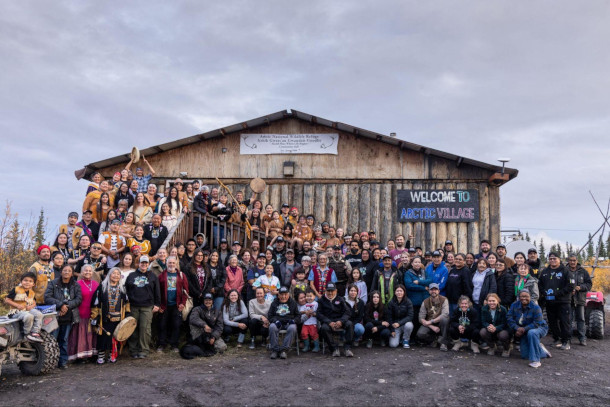
Participants on the last day of the 2025 Emergency Gwich'in Gathering pose together in Vashraii K'oo. (Photo: Emily Sullivan, Gwich'in Steering Committee)
CURWOOD: What does it feel like to have land that is sacred to you and your community be caught up in this political situation?
MORELAND: When we go out on the land and we hunt for our caribou, our men goes out there and hunt for our caribou. And they have such a big pride when they come back and we see racks on their four wheeler, or however they're bringing it back to us, their smiles can just like tear you up because they're bringing home this meat to fill their freezers, to give to elders, to give to the community members. They are so proud, and we need that from our men, because we don't live in the city. We don't have therapists on hand. We live off the land. So, if that gets taken away from us, it will totally wipe us out as Gwich'in people. If oil drilling happens in the coastal plain, that is what will happen to us, as Gwich'in people we’ll no longer be here. There's still hope because no major oil companies want to go up there. Because we have lawyers that are on ground, working, as we speak. We have many allies on our side that is helping us. So, we have hope. That's hope to us. We know that there's so many people right now that is rooting for our land that doesn't want drilling. We're going to continue fighting, and we're going to continue raising our voices and concerns and putting up a fight.
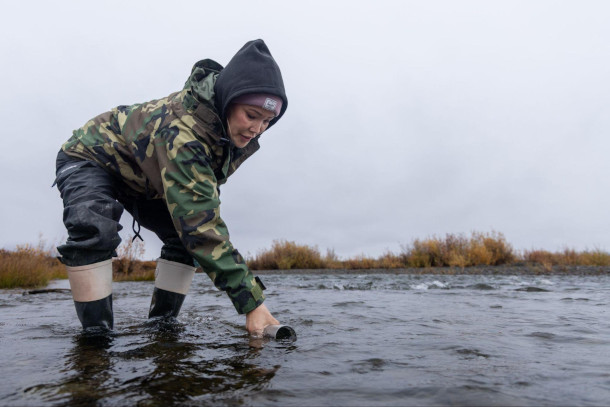
Kristen Moreland collects water from the runoff of a nearby glacier. (Photo: Emily Sullivan, Gwich'in Steering Committee)
CURWOOD: Kristen Moreland is the executive director of the Gwich'in Steering Committee. Thank you so much for taking the time with us today.
MORELAND: Thank you so much Mahsi' choo.
CURWOOD: The US Department of Interior provided a statement about oil and gas extraction and the subsistence rights of Alaska Natives, and it’s posted on our website, loe dot org.
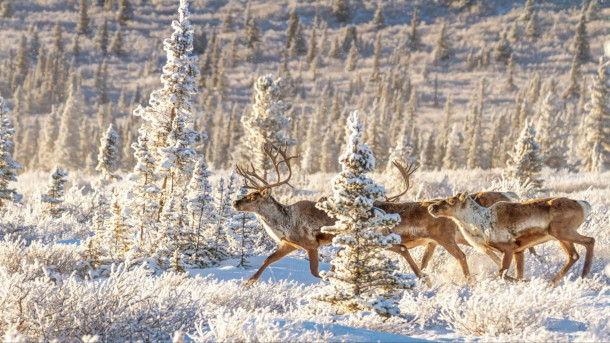
The Gwich’in nation is actively involved in protecting the porcupine caribou (pictured above) and their calving grounds in the Arctic National Wildlife Refuge from threats like industrial development. (Photo: Frostnip907, Flickr, CC BY-NC-SA 2.0)
Links
Learn more about the Gwich’in Steering Committee
Reuters | “US Reopens Alaska Wildlife Refuge to Oil and Gas Development”
KOTZ Local News | “Migrations Can Take Weeks Longer When Caribou Encounter Roads, Study Finds”
Living on Earth wants to hear from you!
Living on Earth
62 Calef Highway, Suite 212
Lee, NH 03861
Telephone: 617-287-4121
E-mail: comments@loe.org
Newsletter [Click here]
Donate to Living on Earth!
Living on Earth is an independent media program and relies entirely on contributions from listeners and institutions supporting public service. Please donate now to preserve an independent environmental voice.
NewsletterLiving on Earth offers a weekly delivery of the show's rundown to your mailbox. Sign up for our newsletter today!
 Sailors For The Sea: Be the change you want to sea.
Sailors For The Sea: Be the change you want to sea.
 The Grantham Foundation for the Protection of the Environment: Committed to protecting and improving the health of the global environment.
The Grantham Foundation for the Protection of the Environment: Committed to protecting and improving the health of the global environment.
 Contribute to Living on Earth and receive, as our gift to you, an archival print of one of Mark Seth Lender's extraordinary wildlife photographs. Follow the link to see Mark's current collection of photographs.
Contribute to Living on Earth and receive, as our gift to you, an archival print of one of Mark Seth Lender's extraordinary wildlife photographs. Follow the link to see Mark's current collection of photographs.
 Buy a signed copy of Mark Seth Lender's book Smeagull the Seagull & support Living on Earth
Buy a signed copy of Mark Seth Lender's book Smeagull the Seagull & support Living on Earth

